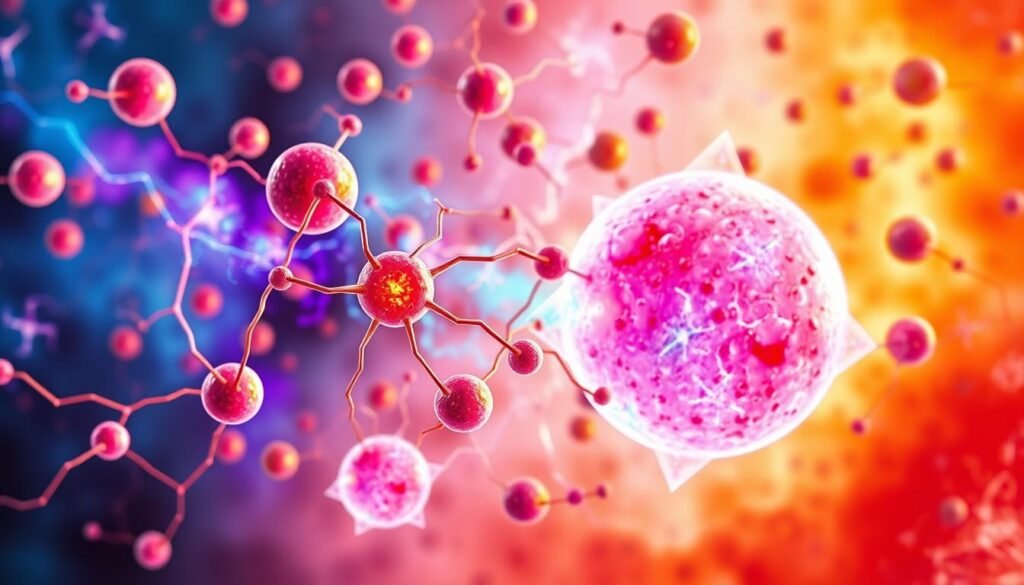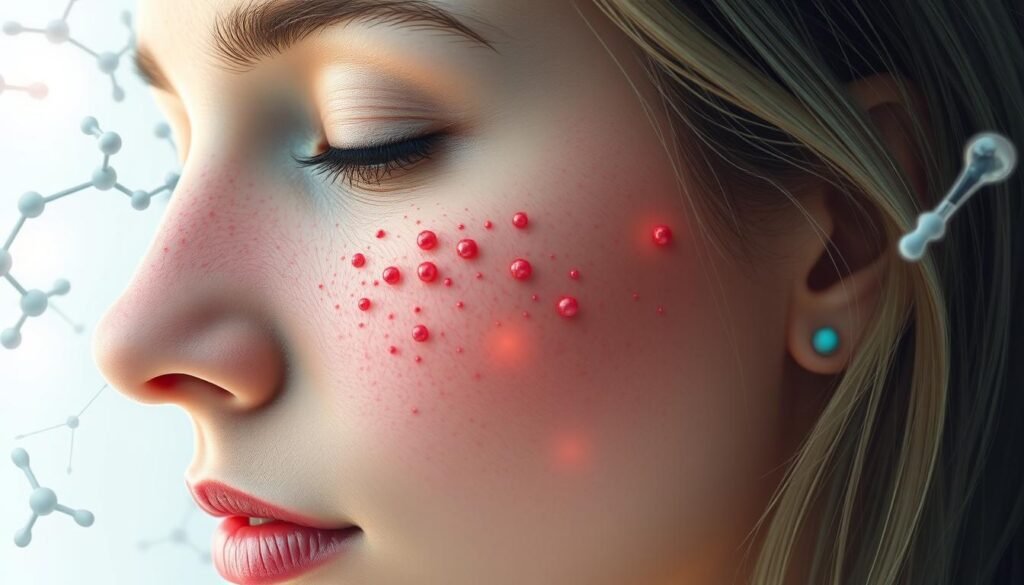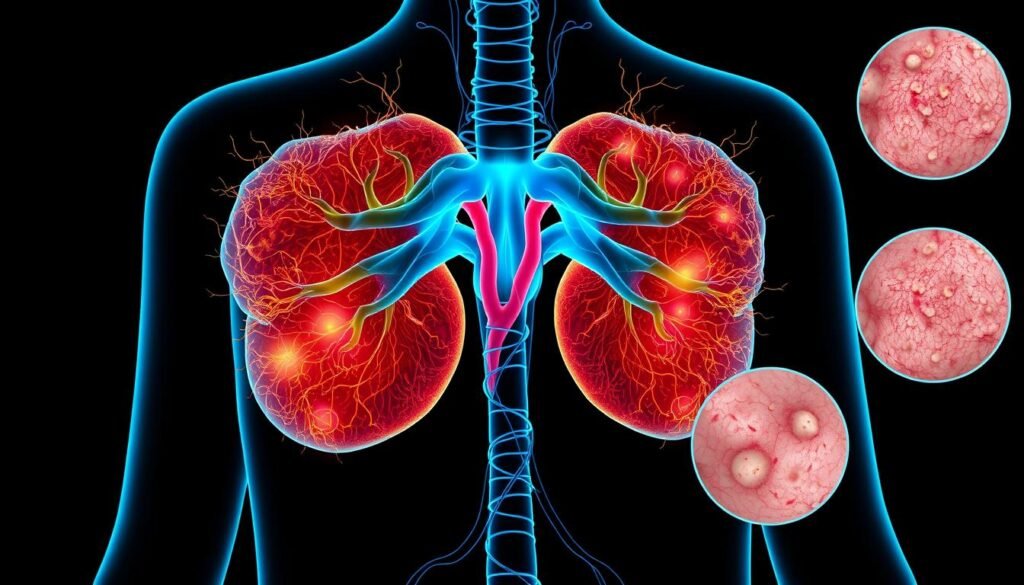About 50 million people in the United States deal with acne at once. It’s not only teenagers; many adult women suffer from hormonal acne too. This type of acne is mainly caused by hormone changes. Hormones like testosterone, estrogen, and progesterone can affect our skin. They can cause acne that shows up as blackheads, whiteheads, and cysts.
Research shows that 20% to 40% of adult women get acne after puberty. It happens more around big life events like menstruation, pregnancy, and menopause. Knowing how hormones affect acne can help us fight it. We will learn more about hormonal acne and what causes it to stick around.
Key Takeaways
- Acne impacts around 50 million Americans at any given time.
- Acne is common in people aged 11 to 30, affecting 80% of them at some point.
- Menstruation, pregnancy, and menopause can all lead to acne due to hormonal changes.
- After puberty, up to 40% of adult women may face hormonal acne.
- Testosterone significantly influences sebum production, leading to acne.
Understanding Hormonal Acne
Hormonal acne is common, especially in adult women. It shows up as breakouts that happen due to hormonal changes. People face various acne types like whiteheads, blackheads, papules, pustules, cysts, and nodules. These issues start when too much sebum production meets dead skin cells, leading to blocked pores.
Hormones play a big role in this problem. For example, androgens increase sebum, causing acne. Many women see more acne around their period. In fact, 85% of adult women say their acne gets worse before menstruation.
Changes in hormones during life events like puberty, pregnancy, and menopause also impact acne. Acne can get worse in early pregnancy but often gets better later on. Birth control pills are effective because they reduce androgen levels, lowering sebum production.
It’s important to understand hormonal acne. Different triggers can worsen symptoms, needing specific treatments. For more details, seeing a dermatologist is a good idea, especially for severe acne. Knowing how to treat hormonal acne well is key for those affected.
Common Causes of Hormonal Fluctuations
Hormones greatly affect how our skin behaves, especially regarding acne. These changes happen during different life phases. Puberty, periods, having a baby, and entering menopause impact hormone levels like estrogen and testosterone.
In puberty, higher testosterone increases oil in the skin, causing acne. For women, hormone changes before their period cause breakouts. Pregnancy also changes hormone levels, affecting the skin.
PCOS plays a big role in hormonal imbalance, increasing testosterone in women. It’s linked to most cases of high male hormones in females. Stress and bad eating habits can make hormone levels fluctuate more, hurting our skin health.
The Role of Androgen Hormones in Acne
Androgen hormones are key in causing acne. Testosterone makes the oil glands produce more oil. This can block pores. People of all genders see their androgen levels rise in puberty. For women, these changes can keep happening, causing ongoing acne problems.

A recent study showed interesting acne stats. It found 41% of people with acne were male, and 59% were female. Among them, 36% had mild acne, 40% had moderate acne, and 24% had severe acne. Testosterone levels were about 3.5 ng/ml. Levels of other hormones were also measured.
There were big differences in hormone levels between people with and without acne. But, hormone levels and acne severity didn’t always match up exactly. Yet, the differences in testosterone and DHEAS levels among acne severity groups suggest a possible connection.
Studies show androgen hormones may help cause acne. They can disrupt the balance of skin bacteria. This can lead to inflammation and make acne worse. The impact of hormones in the skin plays a big role in developing acne.
Over 50% of adult women with acne have unusual hormone levels. This suggests treating hormone imbalances could help. The Indian Acne Alliance sees promise in hormone treatments for women with proven hormone issues.
Understanding the role of androgen hormones in acne can help us find better treatments. This means people can get the help they need to take care of their skin.
How Testosterone Affects Skin Health
Testosterone is key in skin health, mainly by boosting sebum production. This leads to more acne. When testosterone levels go up, like in puberty, people might see more oily skin and blocked pores. Studies show that using testosterone therapy can change acne severity. This means we need good ways to handle breakouts.
For those on gender-affirming therapy, testosterone’s impact on their skin is strong. Acne usually starts within two years of therapy. It often hits the lower face, chest, upper arms, and back. Some may think acne will get better on its own, but sometimes it stays. In serious cases, drugs like isotretinoin may be necessary.
It takes more than meds to manage skin health on testosterone therapy. Good skin care routines help a lot. Dermatologists can give advice on treating other skin or hair issues, like infections. A healthy lifestyle with less stress, more exercise, and good food helps too.
Testosterone and acne issues aren’t only for those on therapy. Many women also deal with androgen hormone issues. Testosterone’s effect on skin is a big deal for many. Knowing about hormone swings and their impact is crucial for dealing with acne. To learn more, check out testosterone and acne.
| Aspect | Details |
|---|---|
| Effects of Testosterone | Increases sebum production, leading to clogged pores and acne development. |
| Acne Onset | Common within 2 years of starting testosterone therapy. |
| Acne Locations | Lower face, chest, upper arms, and back. |
| Persistent Acne | May continue over time despite therapy; treatment plans need adjustments. |
| Treatment Options | Prescription medications like isotretinoin or anti-androgens such as spironolactone. |
Estrogen and Its Influence on Acne
Estrogen is key to keeping your skin in tip-top shape. It regulates things like how much moisture your skin holds and how much collagen it makes. Changes in estrogen happen at different times, like during your period, pregnancy, and menopause. These changes can affect hormonal acne a lot.
During your period, estrogen goes up and down. This can make your skin clearer or not. When you have more estrogen, it can balance out testosterone’s effects, which makes oil. But, if estrogen drops, androgens, like testosterone, can make more oil. This leads to acne. Many women deal with acne during their reproductive years because of these hormone shifts.
Pregnancy makes your estrogen levels go up high. This change can either make your skin clear up or break out, especially in the first trimester. After giving birth, your hormones change again. This can dry out your skin and bring other problems, including acne.
Menopause brings on lots of hormone changes too. Lower estrogen means your skin can get thinner, less moist, and wrinkles may show more. You might also see more acne. But, eating right or getting the right treatments can help with these problems.
Knowing how estrogen and hormones affect your skin is super important. It helps you find the best way to take care of your skin. Looking at how estrogen changes through life can help you understand what your skin needs:
| Life Stage | Effects of Estrogen | Potential Acne Issues |
|---|---|---|
| Menstrual Cycle | Fluctuating levels; higher during ovulation | Breakouts can occur pre-menstruation |
| Pregnancy | Increased estrogen; skin may appear clearer | Initial breakouts in the first trimester |
| Postpartum | Hormones drop; increased dryness | Potential acne and skin sensitivity |
| Menopause | Decreased estrogen; thinner skin | Possible dryness and increased wrinkles |
Progesterone: Another Factor in Hormonal Acne
Progesterone has a big impact on skin health, especially with acne. High progesterone levels make the sebaceous glands produce more oil. This can clog pores, leading to acne. When a woman’s period is coming, progesterone levels go up, often causing breakouts.
Understanding the link between progesterone and hormonal imbalance is key to getting why acne develops. A study in 2016 pointed out progesterone’s role in acne. The kind of hormonal contraceptive someone uses matters too. Contraceptives with only progesterone might make acne worse. But, those with both progesterone and estrogen could help balance hormones and lessen acne.
Other hormones also affect acne, like androgens, insulin, and estrogen. It’s crucial to know that progesterone levels changing can cause acne, not just during the menstrual cycle. A doctor can spot acne by looking at the skin and checking the patient’s history and hormone levels.
There are ways to treat hormonal acne caused by changes in progesterone. These include creams, changing medications, and lifestyle changes. Treatment needs to be tailored, as everyone reacts differently.

Knowing how progesterone and other hormones affect acne helps in finding treatments. Understanding hormonal effects on skin can improve acne management. This brings hope to those dealing with the condition.
Acne and the Menstrual Cycle
The menstrual cycle is closely linked to hormonal acne, impacting many women. About 63% of those with acne see worsenings with their cycle. During the cycle, hormone levels change. Estrogen is high at the start, and then progesterone takes over, causing more oil on the skin.
Acne usually pops up a week or ten days before the period begins. This is when estrogen is at its lowest. At this time, testosterone’s effects are stronger, leading to more oil. This results in painful acne, like cysts, mostly on the lower part of the face.
To handle menstrual acne, tracking your cycle is a good start. Changing how you live, like taking care of your skin, reducing stress, and getting enough sleep can also help. Over-the-counter treatments are useful, and for tough cases, prescriptions may be needed. These can regulate hormones and ease acne.
| Time in Cycle | Hormonal Levels | Possible Skin Effects |
|---|---|---|
| Days 1-14 | High Estrogen | Less Oil Production |
| Days 15-28 | Increasing Progesterone | Higher Oil Production |
| Week Before Menstruation | Decreased Estrogen | Peak in Acne Flare-ups |
Knowing how the menstrual cycle affects acne helps women find the right treatment and care for their skin better.
The Impact of PCOS on Hormonal Acne
Polycystic ovary syndrome (PCOS) is a common issue, affecting about 10 percent of women of childbearing age. It can cause hormonal acne, which is hard to treat. This acne comes from high androgen levels that make too much sebum.
Women with PCOS not only face acne but also have irregular periods, unwanted hair growth, and gain weight. Their hormonal balance gets disrupted. This causes estrogen and progesterone levels to fall while testosterone rises. Consequently, they may have bigger, deeper acne on their lower face.
To tackle hormonal acne from PCOS, there are several treatments. Oral contraceptives that mix ethinyl estradiol with progestins help balance hormones and reduce acne. Anti-androgen medicines also help by lowering high testosterone levels.
Addressing acne is important, but understanding PCOS and its skin effects is key for total care. Making lifestyle changes and trying specific therapies can better regulate hormones. This may ease the ongoing acne battle. For more details on how PCOS impacts hormonal acne and treatment choices, checking out the individual’s unique conditions is crucial. Visit Cleveland Clinic for more information.
Connection Between Adrenal Glands and Acne
The adrenal glands are key in making hormones and help in stress response. When we’re very stressed, these glands make more hormones like cortisol. Too much of these can lead to acne by making oil glands work overtime. This can clog pores and start acne.
Stress doesn’t just make more hormones; it also makes skin issues worse. If stress levels stay high, you might see more acne. Lowering stress through deep breathing, meditation, and yoga helps. These activities improve adrenal health and reduce acne.
Keeping hormones in balance is crucial for clear skin. Understanding the adrenal glands’ role helps in choosing how to prevent or treat acne. For more tips on dealing with hormonal acne, check this resource.

Hormone Therapy as a Treatment for Acne
Hormone therapy has become a key option for those dealing with hormonal acne. It’s especially good for women. It tackles hormonal imbalances that cause acne. Acne treatment often includes oral contraceptives. They help balance hormone levels and lessen acne. The US Food and Drug Administration has approved these pills. They work against blackheads, whiteheads, pimples, and cysts.
Another option is anti-androgen drugs, like spironolactone. A study with 85 women showed great results. About 33% saw their acne completely go away. Another 33% saw big improvements. Only a small number, 7%, saw no change. This shows how effective spironolactone can be.
Taking spironolactone with birth control pills can work even better. People often see results in just a few weeks. Yet, it might take 2 to 3 months to see changes with pills alone. It’s important to take spironolactone at the same time each day.
When looking into hormone therapy, be mindful of possible side effects. You might see changes in your period, feel some breast tenderness, or get tired sometimes. But, the risks are usually low when you’re watched by a doctor. If you’re taking spironolactone, checking your potassium levels is important.
Below is a comparison of different hormone therapy tools for acne treatment:
| Treatment | Onset of Improvement | Effectiveness Rate | Common Side Effects |
|---|---|---|---|
| Oral Contraceptives | 2 to 3 months | Effective for most users | Blood clots, high blood pressure |
| Spironolactone | Weeks | 50% to 100% reduction | Painful periods, fatigue, headaches |
| Combination Therapy | Weeks to 3 months | Higher effectiveness | Breast tenderness, irregular periods |
It’s a good idea to talk with medical experts about hormone therapy. They can create a plan just for you. For those chasing lasting fixes to hormonal acne, balancing hormones could be the key.
Impact of Hormones on Acne and Its Symptoms
Hormones play a big role in acne, affecting how severe it gets and the type of acne symptoms we see. Acne can show up at any age but is most common in teens. This is because of the big hormone changes they go through. For women, acne can stick around into adulthood, especially before their period.
Acne happens due to too much oil, blocked hair follicles, bacteria, and swelling. Hormone changes during puberty, periods, and menopause can make acne worse. About 80% of people between 11 to 30 have acne issues. From age 20, women face it more, showing how hormones affect skin health.
Stress can make acne worse because it raises cortisol levels. Hormonal acne shows up as painful bumps, often deep in the skin. There are many treatments like creams with retinoids and pills like spironolactone. Doctors often suggest using both creams and pills for best results.
- Topical treatments like benzoyl peroxide, azelaic acid, and retinoids
- Oral contraceptives and androgen blockers for hormonal regulation
- Antibiotics for short-term relief targeting bacterial causes
Understanding the link between hormones and acne helps people pick the right treatments. This can lead to better skin health.
Preventative Measures for Hormonal Acne
Managing hormonal acne starts with clear steps. It’s key to look at your diet, stress, and how you care for your skin. These factors are crucial for keeping acne away.
Eating right plays a big part in controlling acne. High sugar foods may raise your acne risk. Eating more low sugar foods helps keep your blood sugar stable. This can make your skin healthier. Cutting back on dairy might also help, as some research links it to acne.
Stress can make acne worse by changing hormone levels. Activities like meditation, yoga, or exercise can lower stress. Finding ways to relax is important for your skin.
Good skin care is also vital. Washing your face twice daily helps clear oil and makeup. Choose makeup that won’t clog pores. Products like topical retinoids can help by keeping pores clear and renewing skin.
Here’s a summarized table of recommended preventative measures:
| Preventative Measure | Description |
|---|---|
| Balanced Diet | Focus on low GI foods and reduce dairy intake. |
| Stress Management | Practice meditation, yoga, or exercise regularly. |
| Skincare Routine | Cleanse twice daily, use non-comedogenic products. |
| Topical Treatments | Consider retinoids and anti-inflammatory solutions. |
| Regular Consultations | Meet with dermatologists to personalize strategies. |
Using these steps daily can help manage hormonal acne well. This approach doesn’t just fight existing acne. It also boosts your skin’s health for the future.
Conclusion
Hormonal acne affects many, especially women, at different life stages. It’s vital to know how hormones like testosterone, estrogen, and progesterone play a part. Hormone changes during the menstrual cycle can affect acne severity. Hormonal contraceptives may help, but results vary with their formulation.
Creating a skincare routine and finding treatment that fits your hormonal profile is key. Adding regular exercise can also help balance hormones, improving skin health. When we understand hormonal impacts on acne, we can manage our skin better. This leads to more confidence and better overall well-being.
In short, knowing about hormonal ups and downs and having a full plan for skin care gives hope to those with hormonal acne. They can take charge of their skin and their lives.